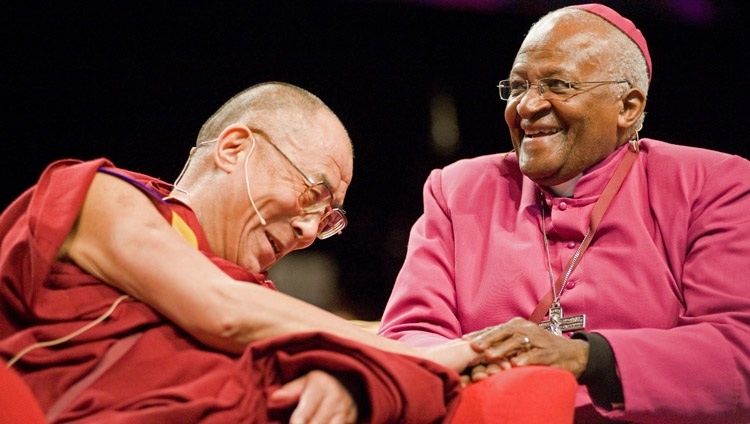
Interfaith Dialogue in Seattle on 15 April 2008. From dalailama.com
His Holiness the Dalai Lama on Sunday shared a message of condolence on the passing of the revered South African Nobel Peace Prize laureate and human rights advocate Archbishop Desmond Tutu. In a letter to the archbishop’s daughter, Rev. Mpho Tutu, His Holiness recalled the spiritual bond he shared with Archbishop Tutu and praised him as “a true humanitarian.”
“Please accept my heartfelt condolences and convey the same to your mother and other members of your family. I pray for him,” the Dalai Lama wrote. “As you know, over the years, your father and I enjoyed an enduring friendship. I remember the many occasions we spent time together, including the week here at Dharamsala in 2015, when we were able to share our thoughts on how to increase peace and joy in the world. The friendship and the spiritual bond between us was something we cherished.” (His Holiness the 14th Dalai Lama of Tibet)
As South Africa prepared for seven days of memorial events and services for Archbishop Tutu beginning on Monday, including a two-day lying in state, the Dalai Lama’s message was just one of a worldwide outpouring of mourning and tributes that followed the news of Archbishop Tutu’s death early on Sunday at the age of 90.
Born to humble beginnings in northwestern South Africa in 1931, Tutu initially trained as a teacher before being ordained as an Anglican priest in 1960. After completing his education in London and Jerusalem, he returned to South Africa in 1967, where used the pulpit and frequent public demonstrations to preach equality and to criticize the injustices, inequities, and abuses of the apartheid era.
Tutu’s focused advocacy garnered him prominence as a human rights campaigner and a vocal activist for racial justice and LGBTQ rights in South Africa and around the world. In 1984, he was awarded the Nobel Peace Prize for his tireless and nonviolent opposition to apartheid, which was to play a key role in bringing down the South African government’s segregationist policies.
In 1985, Archbishop Tutu became the first Black bishop of Johannesburg and in 1986 he was appointed as the first Black archbishop of Cape Town. In the late 1990s, Archbishop Tutu was diagnosed with prostate cancer, subsequently returning to hospital repeatedly for infections related to his cancer treatment.
Although Archbishop Tutu invited the Dalai Lama to attend his 80th birthday celebrations and a planned gathering of Nobel Prize laureates in South Africa in 2011, he was reportedly angered after the South African government refused to issue a visa for His Holiness.
Asked once how he would like to be remembered, Tutu replied: “He loved. He laughed. He cried. He was forgiven. He forgave. Greatly privileged.” (The Washington Post)
Archbishop Tutu is survived by his 66-year-old wife, Nomalizo Leah, and their four children.
“Archbishop Desmond Tutu was entirely dedicated to serving his brothers and sisters for the greater common good. He was a true humanitarian and a committed advocate of human rights. His work for the Truth and Reconciliation Commission was an inspiration for others around the world,” the His Holiness Dalai Lama wrote in his letter.
“With his passing away, we have lost a great man who lived a truly meaningful life. He was devoted to the service of others, especially those who are least fortunate. I am convinced the best tribute we can pay him and keep his spirit alive is to do as he did and constantly look to see how we too can be of help to others.” (His Holiness the 14th Dalai Lama of Tibet)
See more
Condolences in Response to the Death of Archbishop Desmond Tutu (His Holiness the 14th Dalai Lama of Tibet)
Desmond Tutu, South Africa’s foe of apartheid, dies at 90 (The Washington Post)
Related features from BDG
Green Shoots of Hope – Youth Climate Leaders in Asia and Africa
Nurturing the Roots of Chinese Buddhism in Africa
No Poverty: The Sustainable Development Goals and Buddhism












